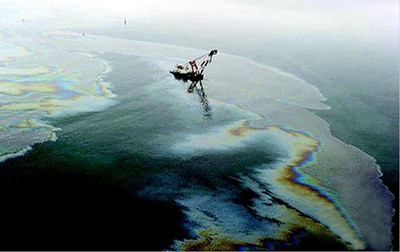Oil and water don't mix.
油與水不能混合。
Despite that age-old axiom, it sure is hard to get spilled petroleum out of seawater, as was evident during BP's blowout in the Gulf of Mexico.
盡管有這樣古老的公理,也很難將泄漏的石油從海水中弄出來,而且英國石油公司在墨西哥灣一事確是證明了這一點。
But what if you could make oil magnetic?
但是如果你能讓石油變得磁化會怎樣呢?
That thought came to physicist Arden Warner while he watched coverage of the spill back in 2010.
這個想法來自于物理學家雅頓華納,他是在2010年看過有關泄漏的報道后迸發出這樣的靈感。
And it launched some garage tinkering for Warner, who by day works on improving particle accelerators at Fermilab.
于是白天在費米實驗室進行粒子加速器的改進工作后,華納晚上在車庫中致力于自己的奇思妙想研究。
He shaved iron bits from a shovel and sprinkled them atop some engine oil.
他將鏟子上的鐵去除,在頂部撒上一些機油。

Lo and behold, a refrigerator magnet pulled the blob of oil wherever he wanted.
你瞧, 無論他去到那里,冰箱磁鐵都可以將油滴剝離。
Now he's got a patent on the concept that he's refined over the past few years.
現在經過幾年的改善他獲得了這一理念的專利。
The Warner method requires only a relatively small amount of magnetic metal dust.
華納的這種方法只需要相對少量的磁性金屬粉末。
And the iron particles mix better with oil than with water, or with anything else the oil might get on, like bird feathers or plants.
而鐵顆粒與油水相比混合,或者同其它石油可能的附著物,比如鳥的羽毛或植物等效果更好。
Another plus: once the oil is collected, the filings can be dried off and reused.
另一個好處是:一旦石油被收集起來,這些碎末可以變干并且再次循環利用。
And iron is more environmentally friendly than the chemicals currently used to disperse oil.
而且鐵比目前在分散石油方面使用的化學品更為環保。
So maybe next time there's an oil spill—and there will be a next time—we can clean up the mess with magnets.
也許下次的石油泄露,肯定會有下一次,可以使用磁鐵收拾殘局。











